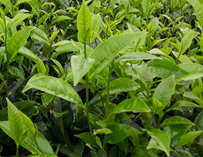
The Effect of Pyraclostrobin Application on Yield of Tea (Camelia sinensis (L.) O. Kuntze) under Wet Season
Arief Rahman(1*), Eka Tarwaca Susila Putra(2), Sriyanto Waluyo(3)
(1) Faculty of Agriculture Universitas Gadjah Mada, Yogyakarta
(2) Faculty of Agriculture Universitas Gadjah Mada, Yogyakarta
(3) Faculty of Agriculture Universitas Gadjah Mada, Yogyakarta
(*) Corresponding Author
Abstract
This field experiment aimed to study the effect of pyraclostrobin on tea production and to determine optimum concentration in order to maintain high yield during the period of wet season. The experiment was arranged in Randomized Completely Block Design (RCBD) using single factor and three blocks as replications. The pyraclostrobin doses, consisted of 4 levels, 0, 50, 100, and 150 g.ha-1, each will be tested on three tea clones. Clones tea tested are TRI 2025, Gambung 9 and PGL 15. Data was evaluated for chlorophyll content, photosynthetic rate, number of pecco, number of dormant shoot (banjhi), number of total shoot, pecco fresh weight, banjhi fresh weight, total shoot fresh weight, and shoot dry weight. Data were analysed by using Analysis of Variance (ANOVA) and LSD test at α = 5%. The results informed that pyraclostrobin was able to improve chlorophyll content on TRI 2025 clone, and improved photosynthetic rate on Gambung 9 clone. However, there was no significant different among plants treated with pyraclostrobin on a yield components, i.e., number of pecco, number of banjhi, pecco fresh weight, banjhi fresh weight, total shoot fresh weight, and total shoot dry weight.
Keywords
Full Text:
PDFReferences
Badan Pusat Statistik. 2015. Statistik teh Indonesia. https://www.bps.go.id/website/pdf_publikasi/Statistik-Teh-Indonesia-2014.pdf (diakses 28 Januari 2016).
Badan Pusat Statistik. 2017. Statistik teh Indonesia. https://www.bps.go.id/website/pdf_publikasi/Statistik-Teh-Indonesia-2017.pdf (diakses 28 Januari 2017).
De Costa, W. A. J. M., D. M. S. Navaratnes and Anandacoomaraswamy. 2009. Physiological basis of yield variation of Tea (Camellia sinensis) during different years of the pruning cycle in the central highlands of Sri Lanka. Experimental Agriculture 45 : 429 – 450.
De Costa, W.A.J.M, Mohotti, A.J, and Wijeratne, M.A. 2007. Ecophysiology of tea. Braz J Plant Physiol 19:299–332.
Effendi, Y. Hariono, D. dan Wicaksono, K.P. 2014. The Effectivness of pyraclostrobin aplication with some level of tempratures stress on corn (Zea mays). Jurnal Produksi Tanaman Vol. 2, 6:497-502.
Hendriyani, I. S. dan Setiari, N. 2009. Kandungan klorofil dan pertumbuhan kacang panjang (Vigna sinensis) pada tingkat penyediaan air yang berbeda. J. Sains dan Mat. 17(3): 145-150.
Kaido, B., Kuswanto dan Wicaksono P.K. 2013. Pengaruh pemberian pyraclostrobin terhadap efesiensi pupuk nitrogen dan kualitas hasil tanaman jagung (Zea mays L.). Jurnal Produksi Tanaman vol 1. 2: 1-7.
Kartawijaya, W.S. 1992. Evaluasi pengaruh kemarau panjang tahun 1991 terhadap produksi di beberapa perkebunan teh. Warta Teh dan Kina 3: 55 – 70.
Khan, N and Mukhtar, H. 2011. Tea polyphenols for health promotion. NIH Public Acces. 81(7): 519-533.
Koehle, H., Grossmann, K., Jabs, T., Gerhard, M.;Kaiser, W., Glaab, J., Conrath, U., Seehaus, K., Herms, S. 2003. Physiological effects of the strobilurin fungicide F 500 on plants.
Krieger, R., J. Doull, D. Ecobichon, D. Gammon, E. Hodgson, L. Reiter, dan J. Ross. 2001. Handbook of pesticide toxicology. Academic Press, London.
Krisyando, P., Indradewa, D. Dan Waluyo S. 2012. Potensi hasil dan toleransi kekeringan seri klon teh (Camellia sinensis (L.) Kuntze) PGL di kebun produksi Pagilaran bagian Andongsili. Fakultas Pertanian. Universitas Gadjah Mada.
Li, R., Guo, P., Baum, M., Grando, S. dan Ceccarelli, S. 2006. Evaluation of chlorophyll content and fluorescence parameters as indicators of drought tolerance in barley. Agricultural Sciences in China. 5(10): 751-757.
Mohotti, AJ and Lawlor DW. 2002. Diurnal variation of photosynthesis and photoinhibition in tea: effects of irradiance and nitrogen supply during growth in the field. J Exp Bot 53:313–322
Mondal, TK. 2014. Stress Physiology. (Eds) Breeding and Biotechnology of Tea and its Wild Species, pp 125-147.
Muningsih, R., Indradewa, D. dan Sulistianingsih, E. 2014. Physiological Characters and Yield of Tea Shoots at Some Age of Production Pruning and Altitude. J. Ilmu Pertanian vol. 17 1: 25-36.
Nasir, M. 2002. Bioteknologi Molekuler Teknik Rekayasa Genetik Tanaman. Citra Aditya Bakti. Bandung.
Pethiyagoda, U. 1967. Physiology as a key to rational tea husbandary. The Cintenari of Ceylon Tea. The Tea Qurterly 1867 – 1967. 38: 128-137
Putri, Y. Sulistyo,Murti, R. Hari, dan Mitrowihardjo. 2015. Evaluasi klon-klon harapan teh (Camelia sinensis (L.) O. Kuntze) keturunan TRI 2024xPS I pada lingkungan berbeda. Journal Vegetalika vol 4, 3: 127-137.
Rahardjo, P., Sukasman, A.A. Salim, Dachman, dan N. Rusmana. 1991. Peranan mulsa dan tanaman pelindung sementara terhadap daya tahan tanaman teh muda dalam kemarau panjang. Warta Pusat Penelitian Teh dan Kina 7: 1 – 5.
Ribeiro, W. R. M. L. P. Pacheco, F. P. Monteiro, F. A. Petter, W. L. de Carvalho, T. O. Sousa, A. V. S. Gualberto, and F. A. Neto. 2014. Fungicides phytotonic action on the development of soybean. African Journal of Agricultural Research 9: 3283-3290.
Scheer, H. 2006. An Overview of Chlorophyll and Bacteriochlorophyll: Biochemistry, Biophysics, Function and Applications. Chapter 1.In: Grimm, B., Porra, R.J., Rudiger, W., and Scherr, H (ed). 2006. Chlorophyll and Bacteriochlorophylls, Biochemistry, Biophysics, Functions and Applications. Volume 25. Springer. Nederlands. p. 1-26.
Spillane, J. J. 1992. Komoditas teh peranannya dalam perekonomian Indonesia. kanisius. Yogyakarta. 276 hal.
Vanessa, C. and Williamson, G. 2004. A review of the health effects of green tea catechins in in-vivo animal models. J. Nutr. 134: 3431-3440.
Venancio, W.S., Rodrigues, M.A.T., Begliomini, E., de Souza, N.L. 2003. Physiological effects of strobilurin fungicides on plants. Publ. UEPG Ci. Exatas Terra, Ci. Agr. Eng., Ponta Grossa, 9 (3): 59-68.
Wijoseno, G., Indradewa, D. Dan Putra, E.T.S. 2012. Potensi hasil dan Toleransi Curah Hujan Beberapa Klon Teh (Camellia sinensis (L.) O. Kuntze) PGL di Bagian Kebun Kayulandak PT Pagilaran. Fakultas Pertanian. Universitas Gadjah Mada.
Yuliana, R.A., Indradewa, D. dan Ambarwati, E. 2013. Potensi Hasil dan Tanggapan Sembilan Klon Teh (Camelia sinensis (L.) O. Kuntze) PGL Terhadap Variasi Curah Hujan di Kebun Bagian Pagilaran. Jurnal Vegetalika Vol2. 3: 54-67.Article Metrics
Refbacks
- There are currently no refbacks.
Ilmu Pertanian (Agricultural Science) ISSN 0126-4214 (print), ISSN 2527-7162 (online) is published by Faculty of Agriculture Universitas Gadjah Mada collaboration with Perhimpunan Sarjana Pertanian Indonesia (PISPI) and licensed under a Creative Commons Attribution-ShareAlike 4.0 International License.











_2025_-_kecil_.png)
_2024_kecil_2.png)
